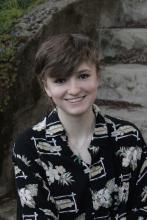By Victoria Pang ‘25
From Pullman, WA, Makenna lived near Washington State University, which allowed her to take different college-level courses during her high school years. Though actively involved in theater, she found the sciences intriguing, and elected to take biology classes at WSU to explore her interests. While she found her biology classes fascinating, it was also during this time that she discovered her interest in chemistry, realizing she was good at it, despite many people warning her that it was a rather difficult subject to learn. This recognition of her own strengths and interests led her to pursue both a major in biochemistry and chemistry at the University of Washington.
Seeking Research Opportunities
Setting her sights on being some form of “scientist” as a career, she began to do her own research to find information on how to get into graduate school and become a scientist. While perusing some online forums, she saw threads about others recommending that graduate school hopefuls begin conducting research at the undergraduate level, and decided to begin finding opportunities to participate in undergraduate research. To find a research lab that would take her in, she began consulting staff in the Office of Undergraduate Research, who provided help with drafting emails to send to professors and researching what labs would be compatible with her. “The Office of Undergraduate Research has been very helpful to me,” she notes, and suggests other undergraduates consult the Office when looking for research opportunities. She also recommends undergraduates to attend Research Café, which is a recurring monthly event hosted by the Office to learn about what other undergraduates have done in their research—and enjoy some free donuts while they’re at it.
Current Research with Dr. Claudia Vasquez
Currently, Makenna conducts research with Dr. Claudia Vasquez, a professor in the biochemistry department at the University of Washington. The Vasquez lab studies the mechanisms in which organs obtain their shape, and Makenna’s specific research project focuses on investigating the role of beta-catenin in organ development. Beta-catenin is a protein that serves to regulate cell-cell adhesion, and is vital in the development of organisms. To do this, Makenna primarily works with lab-grown Drosophila, more commonly known as fruit flies, which are excellent model organisms to use in research due to their short lifespan and their ability to produce lots of offspring at a time. Specifically, she first manipulates the amount of beta-catenin a fly produces through manipulating its genetics, then observes the growth of their renal tubules through various methods. One method she uses is live imaging, which allows for the observation of these tubules’ growths in real time. Another method she uses is immunostaining, which gives proteins (in this case, beta-catenin) a unique color when observed under the microscope. “Whenever I do immunostaining, I have to put on a lab coat and work under a chemical fume hood,” she says, smiling. “It all feels very official.”
Mentorship in a Small Lab Setting
As a member of a fairly new lab consisting of only three graduate students and two undergraduates, Dr. Vasquez serves as Makenna’s primary mentor. Makenna meets with Dr. Vasquez for one hour every week, which she notes is a privilege compared to undergraduates doing research in larger labs, who may not have the opportunity to meet with their primary mentoring professor as often due to other constraints. “Talking about my research to someone with so much expertise and knowledge has been so valuable,” says Makenna. "Whenever I run into problems with my experiments, she would suggest things that I wouldn't have even thought about." While Makenna does not directly work with a graduate mentor, she notes that graduate students in the Vasquez lab have been very supportive and helpful in her day-to-day lab activities as well as in her research.
Makenna is also a recipient of the Institute of Stem Cell and Regenerative Medicine (ISCRM) fellowship, which is a fellowship given to undergraduates pursuing research related to stem cells and regenerative medicine. She describes the selection process as rigorous, but this opportunity has allowed her to spend her summer doing research full-time, learn from world-class researchers as well as hone her presentation skills. This has only solidified her aspiration to go to graduate school, in which she hopes to continue doing research and earn a Ph.D. After completing graduate school, she hopes to pursue a career in the pharmaceutical industry, working in the research and development of therapeutics.
Advice for Aspiring Undergraduate Researchers
Reflecting on her experiences, Makenna urges budding undergraduate researchers not to skimp on reading literature. “I delayed reading papers that [Vasquez] assigned to me, and I wish I didn’t—it would have helped me understand my research so much better.” However, the most important piece of advice she has for fellow undergraduates? “Don’t be afraid to ask questions. [Researchers] are often excited to talk about what they’re working on, and will be more than happy to talk to you about it.”
To learn more about conducting undergraduate research at the University of Washington, explore the Department of Chemistry’s Undergraduate Research page, meet with an undergraduate adviser, visit the UW Office of Undergraduate Research, or reach out to Free Radicals, the undergraduate student club for chemistry and biochemistry majors.
